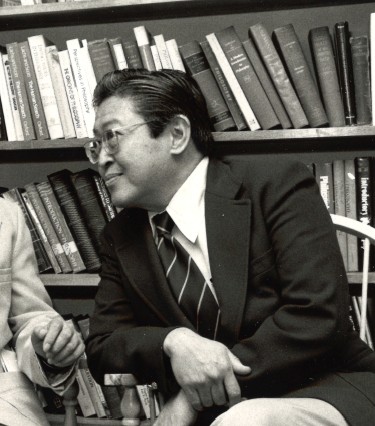The Antonio S. Cua Memorial Lecture was established in 2007 through the generosity of Professor Cua’s family as a way of preserving his memory and advancing his scholarly work by supporting public lectures presented by the School of Philosophy in the areas of Chinese and Western moral philosophy.
About Professor Cua
 Antonio S. Cua (1932-2007) was a distinguished member of the faculty of the School of Philosophy from 1969 until his retirement in 1996. He was a specialist in Western and Chinese moral philosophy, especially the Confucian tradition. Dr. Cua grew up in Manila and studied philosophy at the Far Eastern University and the University of California at Berkeley. He taught at Ohio University and the State University of New York at Oswego before joining Catholic University’s faculty. He authored six books and over 70 scholarly articles. Among his books were Ethical Argumentation: A Study of Hsun Tzu’s Moral Epistemology (1985), Moral Vision and Tradition: Essays in Chinese Ethics (1988), and Human Nature, Ritual, and History: Studies in Xunzi and Chinese Philosophy (2005). He was also chief editor of the landmark Encyclopedia of Chinese Philosophy (2003). He served as president of the International Society for Chinese Philosophy, the Society for Asian and Comparative Philosophy, and the Association for Asian Studies.
Antonio S. Cua (1932-2007) was a distinguished member of the faculty of the School of Philosophy from 1969 until his retirement in 1996. He was a specialist in Western and Chinese moral philosophy, especially the Confucian tradition. Dr. Cua grew up in Manila and studied philosophy at the Far Eastern University and the University of California at Berkeley. He taught at Ohio University and the State University of New York at Oswego before joining Catholic University’s faculty. He authored six books and over 70 scholarly articles. Among his books were Ethical Argumentation: A Study of Hsun Tzu’s Moral Epistemology (1985), Moral Vision and Tradition: Essays in Chinese Ethics (1988), and Human Nature, Ritual, and History: Studies in Xunzi and Chinese Philosophy (2005). He was also chief editor of the landmark Encyclopedia of Chinese Philosophy (2003). He served as president of the International Society for Chinese Philosophy, the Society for Asian and Comparative Philosophy, and the Association for Asian Studies.
Upcoming Lecture
Friday, March 28th, 2025
The Fragmentation of Practical Wisdom in Medieval Philosophy
Tobias Hoffmann, Sorbonne Université, Paris, France
Professor of Medieval Philosophy
The lecture will take place at 3 pm in the Aquinas Hall Auditorium. Reception with light refreshments to follow.
Event Links: Alumni Registration Page, Detailed Event Page, Event Flyer.
Lecture Abstract
According to Aristotle, phronesis (practical wisdom, prudence) is the intellectual virtue that allows one to make good decisions concerning life as a whole. Thus it is a single virtue that governs all aspects of the moral life and that serves therefore as prerequisite for all the moral virtues. Phronesis requires itself the presence of the moral virtues, which maintain focus on what is truly beneficial. Due to this interdependence, Aristotle argues that an individual possesses either all the moral virtues or none. In the thirteenth century, a rather unsuspicious thinker introduced the idea that prudence is not a singular virtue but rather a set of distinct prudences, each governing a specific domain of life. On that view, the moral virtues can be cultivated separately, much like one might master a particular craft without mastering others. This paper will explore the controversy between defenders of a single, unified prudence and those of multiple prudences. The debate concerns not only the conception of prudence, but of ethics tout court. Historically, the proponents of the multiple-prudences view had the upper hand, but there remain strong reasons in favor of Aristotle’s original position.
Past Lectures
2014 Lecture
Aristotle and Aquinas on Mixed Actions
Tianyue Wu, Peking University, Beijing, China
Lecture Flyer
2009 Lecture
Pride or Humility? Aristotle or Confucius?
May Sim, College of the Holy Cross
